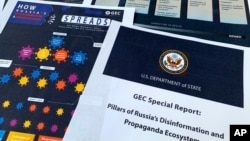Less than two weeks after senior U.S. officials warned that Russia, China and other adversaries were set to launch a variety of influence operations and disinformation campaigns aimed at the upcoming midterm elections, researchers are finding traces of the malign efforts online.
A report Thursday by the cybersecurity firm Recorded Future warned that Russia and China, in particular, have resurrected dormant social media accounts or have amplified other ongoing influence operations to sway U.S. voters or sow chaos and discontent as Americans go to the polls.
Compared to the 2020 U.S. presidential election, the researchers found that “such behavior has likely only intensified against the backdrop of conventional and hybrid warfare in Ukraine, broad international ramifications of said conflict, lingering effects of a global pandemic, and a broadening distrust in traditional democratic institutions.”
Both Russia and China have long denied election meddling, but the findings would seem to bolster concerns recently voiced by the U.S. Federal Bureau of Investigation. The FBI warned last week that while the county’s election infrastructure is secure, malicious cyber actors like Russia, China and also Iran “could seek to spread or amplify false or exaggerated claims of compromise.”
According to Recorded Future, Russia so far appears to be the most active, despite a deterioration of its U.S. influence capabilities, which have likely been drained by Moscow’s efforts against Ukraine.
Russia
Specifically, the researchers found indications that Russia’s infamous troll farm, the Internet Research Agency (IRA), is back at work, targeting U.S. voters with covert and overt influence campaigns.
Part of the effort, the researchers said, has involved reactivating accounts on social media platforms like Gab and Gettr that cater to conservative audiences in the United States.
One such account under the name “Nora Berka” began posting on Gab in August after a yearlong absence.
“In almost all cases, Nora Berka maintains a highly negative stance toward the policies of U.S. President Joe Biden, with a clear preference for former President Donald Trump, as well as sitting Republican U.S. representatives and candidates for state offices,” the report said. “Comments posted by the persona further maintain that the result of the 2020 election was fraudulent.”
Another recently reactivated account under the name “PaulPedhoven” has been resharing content on the “patriots[.]win” forum, much of it critical of the Biden administration’s economic policies and questioning the safety of COVID-19 vaccines, the report said.
China
Like Russia, Recorded Future found China is also seeding social media with narratives denigrating the U.S. and with what the researchers described to VOA as “political wedge issues related to the midterms.”
Unlike Russia, however, the report said Beijing is mostly relying on diplomats, journalists with Chinese state-run media outlets and political pundits, whose messages are then amplified by fake personas and other inauthentic accounts.
Recorded Future said China’s influence operations, such as a recent campaign that began last month, span platforms like Facebook, Instagram, YouTube, TikTok and Douyin, described as a Chinese-language version of TikTok.
“Many of these [posts and comments] appear to criticize both the Republican and Democrat parties and promote extreme views on both sides,” the Recorded Future report said.
Iran
Analysts from Recorded Future's Insikt Group found few traces of Iranian malign influence campaigns currently targeting U.S. voters, though they told VOA by email that Iranian actors have used the elections to share “propaganda, misinformation, and disinformation … leveraging themes such as an impending U.S. civil war, economic collapse, and a decline in U.S. stature on the world stage.”
Responses
Requests by VOA to the Russian embassy and to the Iranian Mission to the U.N. for comment on U.S. warnings and the Recorded Future report were not immediately answered.
China’s embassy on Friday rejected allegations in the Recorded Future report, accusing the researchers and others of spreading disinformation about China.
“We are firmly opposed to this allegation, which is totally groundless and malicious,” Chinese Embassy spokesperson Liu Pengyu told VOA in a statement.
“China has always adhered to the principle of non-interference in other countries' internal affairs,” Liu added. “China has no interest in and has never interfered in the U.S. domestic elections.”
Iran has previously rejected U.S. government accusations of election meddling in 2020 as “baseless.”
Violent domestic extremists
Not all the threat streams are from overseas.
Like the U.S. Department of Homeland Security, which warned that domestic extremists might seize upon the midterm elections to engage in violence, the Recorded Future report found reason for concern.
“Violent anti-law enforcement sentiment has proliferated on message boards such as Patriots[.]win and alternative social media platforms such as Gab and Truth Social, where comments about a new civil war and suggestions to execute FBI agents are now commonplace,” the report said.
And just as Russia has been amplifying its messaging, some of the extremists are doing the same for the Kremlin.
“We’re seeing many election deniers and domestic extremist groups who are completely witting to Russia’s influence and who choose to amplify the lies anyway,” Insikt Group told VOA. “It’s a symbiotic relationship, and Moscow knows it will receive support/compliance from the U.S. fringe without having to obscure its own hand.”
Impact
Officials, as well as researchers, caution it is difficult to measure the impact of influence campaigns targeting the U.S., whether foreign or domestic in nature.
But Americans appear to be worried.
A new Pearson Institute/AP-NORC poll released Thursday found that 91% of adults surveyed called the spread of misinformation a problem, while about 70% said it contributes to extreme political views and hate crimes.
More than half of those surveyed further said misinformation works to increase political engagement.
Recorded Future believes the concern is justified.
“Malign influence campaigns that seek to exploit and exacerbate existing social cleavages, which we have observed Russian entities specifically engaging in, are likely to find fertile ground,” according to Insikt Group, responding to questions from VOA.
“The tendency of these campaigns to proliferate on alternate social media platforms suggests that the audiences found there are considered most susceptible to manipulation,” the researchers added.





